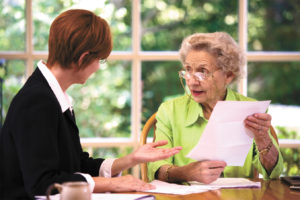By Teresa K. Bowman, Of Counsel
 As we age, changes to our body, health, financial picture and family are ever-evolving. When we were young, we didn’t worry about infirmity, incapacity, or how we wanted our estates to be managed. But as time marches on, those issues move to the forefront of our lives. As elder law attorneys, we use our legal knowledge to help aging and disabled clients find solutions to problems as they arise, and formulate plans to avoid problems in the future. The work we do focuses on the needs of the client and may or may not always involve a legal solution.
As we age, changes to our body, health, financial picture and family are ever-evolving. When we were young, we didn’t worry about infirmity, incapacity, or how we wanted our estates to be managed. But as time marches on, those issues move to the forefront of our lives. As elder law attorneys, we use our legal knowledge to help aging and disabled clients find solutions to problems as they arise, and formulate plans to avoid problems in the future. The work we do focuses on the needs of the client and may or may not always involve a legal solution.
Being elder law attorneys means we must have a working knowledge of many areas of the law, such as estate planning, asset protection, Medicare, Medicaid, Social Security, Supplemental Security Income (SSI), veterans’ benefits, long-term healthcare insurance, guardianship, special needs trusts and disability planning, probate, trust administration, elder abuse and elder exploitation, nursing home discharge issues, patient rights, retirement benefits, health law, and mental health law. It’s a long list, but most clients have issues that span across many of those areas and planning can be complex.
Being elder law attorneys means we practice using a holistic approach, thinking about the issue at hand, but also considering future issues that might arise and how to plan for them. Our job is to point out the potential “holes in the road” that may come up, and help clients stay out of those holes. In addition, we consider the financial and mental well-being of the family as a whole, which means having knowledge of community resources to provide support to those with nonlegal needs such as help with caregiver stress and financial management.
As elder law attorneys, we keep a box of tissues on our desks, provide adequate lighting for those with vision issues, supply our offices with chairs that are easy to get in and out of, use a larger font on the firm’s website, and hire staff members that are compassionate and have a genuine interest in the practice. Our clients may have hearing issues and not be technically savvy, so we meet the client where he or she is comfortable, and often communicate through “snail mail” rather than by email or phone.
Not all of our clients are elderly. In my practice I serve special needs clients of all ages, from children to adults. My office is wheelchair-friendly and able to accommodate all family members who want to be involved in seeking solutions for their loved one, especially when the client is a child with special needs.
Being an elder law attorney means I must listen with a sympathetic ear, let my clients have time to tell their story, and not rush them through the process. This time is important not only to them but to me as well, as it gives me a greater understanding of their needs and how I can help.
Being elder law attorneys means we go to hospitals, nursing homes, assisted living communities, and clients’ homes. If a client can’t get to us, we go to them. Many times, meeting a person in their own home makes a difficult conversation a bit easier.
When choosing an elder law attorney, look for someone who focuses his or her practice exclusively on elder law and has the experience to provide quality guidance, the compassion to listen, and the willingness to accommodate your needs before, during and after the initial consultation.
McLin Burnsed Attoneys at Law
Villages, FL 32162
352-259-5011 | www.McLinBurnsed.com
Check Also
CUSTOMIZABLE LIGHT ADJUSTABLE LENS A GAMECHANGER FOR CATARACTS PATIENTS
All Americans have some degree of cataract change by the age of 75. As the …
 Central Florida Health and Wellness Magazine Health and Wellness Articles of the Villages
Central Florida Health and Wellness Magazine Health and Wellness Articles of the Villages



